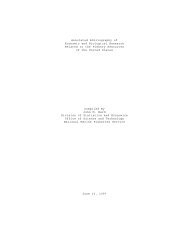West Coast Groundfish Observer Program Manual, Part2 - NOAA
West Coast Groundfish Observer Program Manual, Part2 - NOAA
West Coast Groundfish Observer Program Manual, Part2 - NOAA
Create successful ePaper yourself
Turn your PDF publications into a flip-book with our unique Google optimized e-Paper software.
APPENDIX P<br />
safety rather than to such other safety concerns as the environment. NMFS should also consider<br />
which safety requirements warrant giving observers ‘‘the extraordinary authority to prevent a vessel<br />
from undertaking a fishing trip.’’<br />
Response: NMFS is not giving greater significance to some USCG regulations than to others.<br />
NMFS is encouraging observers to check for compliance with existing regulations. A safety decal is<br />
considered to be evidence of compliance, but if there is other obvious non-compliance, the observer<br />
has the option of not boarding the vessel. If the vessel operator disputes the observer’s decision,<br />
which should be based upon published USCG guidance on some of the most important items that<br />
would be required in the event of an at-sea emergency, and no resolution is reached, the vessel<br />
operator should call the USCG to request reexamination of the issue in dispute. The addition of §<br />
600.746(c)(3) clarifies which items the observer should check at the time of boarding. The observer’s<br />
pre-trip safety check will be made in accordance with published <strong>Coast</strong> Guard Guidance on some of<br />
the most important items that would be required in the event of an at-sea emergency. NMFS<br />
recognizes that, in some circumstances, an observer may raise a safety question that requires a vessel<br />
to wait for a USCG boarding before fishing. It is true that this could result in a loss of fishing days.<br />
In structuring the rule this way, NMFS had to weigh the impacts of this approach versus the impacts<br />
of alternative approaches. Just as there is a potential for a vindictive observer declining to board and<br />
thereby delaying a vessel’s departure, other approaches would have raised the possibility of an<br />
observer being coerced into boarding a vessel that he or she believes is unsafe. Given the safety risks<br />
at issue and the probability that most safety violations will be easily remedied, e.g., replacing PFDs,<br />
NMFS determined that placing the presumptions in the selected manner was preferable.<br />
Whenever possible, vessel owners/ operators are encouraged to arrange for the observer to make the<br />
pre-trip safety check in advance of the beginning of the planned fishing trip. In that way, there would<br />
be time to correct problems without delaying the trip’s departure time.<br />
Comment 18: There are alternatives that would accomplish NMFS’ objectives that were not<br />
considered by NMFS. One alternative is to provide an automatic waiver for those situations in which<br />
an observer refused to board a vessel for safety reasons. The waiver would be valid until the vessel<br />
had undergone a USCG inspection either at sea or in port. Alternative two would be to require that<br />
the safety determination be made by a NMFS enforcement agent who had completed the USCG<br />
training program for vessel safety inspections. Alternative three would be to determine which classes<br />
of vessels have consistently failed to provide safe working conditions for observers. Only those<br />
classes of vessels would be required to comply with the rule. Vessels with proven safety records<br />
would be exempt from the provisions of this rule.<br />
Response: Alternative one would void the intent of the rule. It would not make the vessel safe for<br />
the observer on the fishing trip that the observer was assigned to observe. Furthermore, it could<br />
provide an opportunity for vessel operators to avoid taking observers by incurring safety violations,<br />
such as no PFD for the observer. By authorizing an observer to refuse to board an unsafe vessel and<br />
by making it illegal to fish without an observer in a mandatory observer fishery, there is a strong<br />
incentive for the vessel to meet all USCG safety regulations. Alternative two was considered and<br />
rejected. It is equally possible that a NMFS enforcement agent, like an observer, would discover a<br />
safety violation that would delay a vessel’s fishing trip. This option would also create the risk of an<br />
observer having to board a vessel that he or she believes is unsafe. In addition, from a practical<br />
standpoint, the current work load for NMFS enforcement agents makes it impossible for them to<br />
undertake this responsibility and continue to perform other enforcement functions/duties.<br />
Alternative three is not feasible because vessel safety is an individual vessel issue not one that can be<br />
addressed by classes of vessels.<br />
Comment 19: The rule does not analyze measures taken by regions.<br />
Response: It is not the intent of this rule to analyze measures taken by regions. That analysis is<br />
done at the time those measures are developed and proposed in the rulemaking process.<br />
Comment 20: One commenter believes that, should an observer refuse to board a vessel because<br />
of safety deficiencies, there could be legal implications beyond the simple issue of the USCG safety<br />
requirement and the vessel’s fishing. ‘‘After an observer has determined a vessel to be unsafe, a crew<br />
1/30/2004 A- 45
















